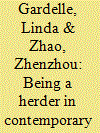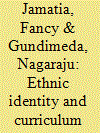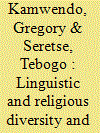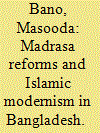| Srl | Item |
| 1 |
ID:
165140


|
|
|
|
|
| Summary/Abstract |
Construction of a nomadic identity in contemporary society has received increasing attention as the result of multiple challenges, including industrialisation, the formation of nation-states and a global market system. Mongolia provides an interesting case study for examination of the self-representations of nomadic peoples and their intricate relationship with national identity-building in a developing society. Based on an analysis of 28 school textbooks on social studies subjects and the narratives of herders in two regions of Mongolia (Bulgan and Bayankhongor), this study examined the interplay between the ‘Mongol malchin’ (Mongolian herder) identity and the construction of a Mongolian national identity in the state’s dominant discourse and herders’ living experiences. The study’s findings revealed how a nomadic identity is interpreted in post-socialist Mongolian society to accommodate social changes and the political agenda of building nationhood.
|
|
|
|
|
|
|
|
|
|
|
|
|
|
|
|
| 2 |
ID:
165137


|
|
|
|
|
| Summary/Abstract |
The paper aims to understand the role of school textbooks and curriculum in shaping the majority and minority identity in Tripura. Though Tripura is a tribal majority state, the partition of the country led to the influx of Bengali Hindus. Based on the sociological analysis of history and language textbooks in Tripura schools, the paper argues that the state is systematically projecting the Bengali Hindu identity as ideal and marginalising the identity of diverse tribal groups. Dominant language, religion and cultural practices of the Bengalis were celebrated whereas the linguistic diversity and spiritual pathways of the subaltern communities are either ignored or mentioned peripherally. Since the inception of formal education in Tripura, the state failed to develop the tribal languages and script which led to the ideological submission of ethnic groups to the dominant identity. Thus, Tripura witnessed an ideological shift from the multiple identities to monolithic identity works on the principle of Banglanization of the state and civil society.
|
|
|
|
|
|
|
|
|
|
|
|
|
|
|
|
| 3 |
ID:
142510


|
|
|
|
|
| Summary/Abstract |
Botswana, an African country, is characterized by linguistic and religious diversity. To this end, the paper assesses the extent to which the school curriculum accommodates and reflects the country’s linguistic and religious diversity. The paper argues that whilst Botswana’s Vision 2016 calls on the education system to accommodate linguistic diversity, the curriculum does not do so. Through the pursuit of a linguistic assimilation policy, the education system promotes and recognizes only one local language (Setswana), leaving other local languages out of the curriculum. In contrast, the curriculum houses a multi-faith religious education. This brand of religious education is an attempt to accommodate the religious diversity that exists in Botswana. Previously, schools had a mono-faith religious education syllabus. The multi-faith syllabus is considered to be a meaningful way of enabling learners to appreciate religious diversity.
|
|
|
|
|
|
|
|
|
|
|
|
|
|
|
|
| 4 |
ID:
132963


|
|
|
|
|
| Publication |
2014.
|
| Summary/Abstract |
The old project of modernizing madrasas has acquired a new zeal in South Asia after September 2011, whereby madrasa reform programmes became an acknowledged soft tactic of the war on terror. With 9000 Aliya (reformed) madrasas, the Bangladesh madrasa modernization programme has been identified as a potentially useful model for the neighbouring states of Pakistan and India who have made slower progress in implementing similar programmes. In this paper I argue that, although the Aliya madrasa system in Bangladesh has succeeded in integrating secular subjects in the madrasa curriculum, in reality this modernization project has failed in its underlying ambition to generate a 'modern discourse' on Islam-a discourse that is compatible with the demands of western modernity. The right to speak for Islam is still primarily exercised by the 'ulama and graduates of the Qoumi (unreformed) madrasas. Aliya madrasas today compete with the secular schools not with Qoumi madrasas. The growth of the Aliya madrasa system in Bangladesh, instead of bearing testimony to the popular appeal of the modernization agenda, demonstrates the preference of Muslim parents for increased Islamic content in the school curriculum
|
|
|
|
|
|
|
|
|
|
|
|
|
|
|
|